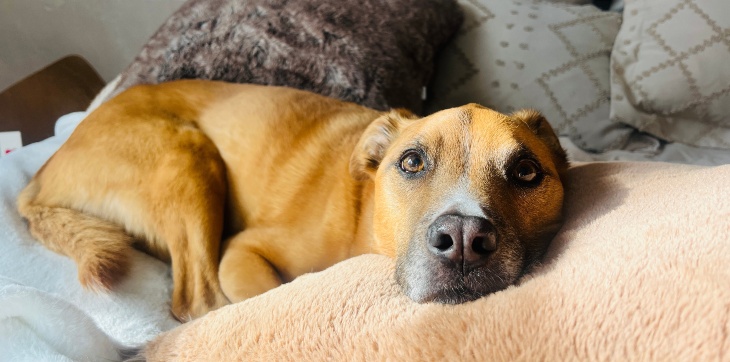Why Is My Dog So Clingy? 7 Reasons and Tips to Help
It isn’t entirely out of the ordinary for your dog to want to spend time with you, whether at home or outside. But if you tend to find them constantly lingering at your feet, pawing you for attention, or panicking when you leave the house, they might have developed some clingy tendencies.
These behaviors are pretty common, and there are several explanations why your furry friend may be acting so dependent. If you’re wondering “why is my dog so clingy?” lately, here are some common reasons they may be sticking in your shadow.
6 Reasons Behind Clingy Dog Behavior
#1: They’re Bored
Dogs are intelligent animals who like to stay active and engage their brains, so without proper stimulation, they get bored. If they’re sticking close to you, especially when holding their favorite toy, it might just mean they want to play! This may be the case if you’ve been busier than usual and they haven’t had much one-on-one playtime.
Staying active is a great way to tackle boredom, and there are many ways to exercise with your dog. Aside from engaging in playtime, taking a walk or even biking with your dog are fun and effective ways to tire them out and fight boredom. In addition to physical activity, there are also many dog brain games sure to offer a different type of boredom-busting fun!
#2: They Learned It
Clingy tendencies may have developed as a learned behavior, especially if you stuck close to your dog in puppyhood. Sharing a close bond with your dog is positive, but those early interactions may have contributed to clinginess and other behaviors you see today.
This is where healthy boundaries come in. To take the attention away from you and accustom your dog to alone time, provide them with an independent activity such as chewing a long-lasting bully stick or other chew. You can also give them their very own space (like a crate or bed) or socialize them with other people or dogs.
#3: They Don’t Feel Well
Another explanation for sudden clingy behavior could be that your dog is sick or just not feeling their usual self. Any drastic shift in your dog’s behavior should be noted, such as unusually low energy levels or any sudden changes in personality.
From minor stomach trouble to muscle or joint pain, there are several factors that could prevent your dog from feeling their best. If you believe your dog may be sick, make note of symptoms and contact your vet right away.
#4: They’re in Heat
If your female dog is being clingy and they’re not spayed yet, it could be a sign they are going into heat. Female dogs experience what’s called the heat cycle, which is the time they are most receptive to mating. Your dog’s heat cycle can vary depending on how big she is; small dogs can go into heat up to four times a year, while big dogs might only have a heat cycle once every 18 months.
#5: They’re Getting Older
Clingy behavior is common in senior dogs. As dogs age, they tend to experience health issues and a decline in their senses, which can cause them to feel anxious. To remedy this, they trust their pet parents to guide them in certain circumstances, such as when they are around strangers or in a different environment.
#6: They’re Jealous
If your dog is being clingy after a new furry friend or baby has entered your family, it could be that they’re jealous. It’s normal for your dog to envy the presence of a new (furry or human) sibling in the household, especially if they were an “only child” for a long period of time. It’s important to properly introduce your dog to new pets or children to help them adjust.
#7: They Have Separation Anxiety
While following in your shadow may just be a sign that your dog loves you, sticking too closely could be a sign of separation anxiety. Separation anxiety can cause your dog distress, leading them to stick close to you for familiarity and comfort. Their clingy behavior is typically accompanied by pacing, digging, shaking, or having potty accidents in the house.
There could be many factors that trigger your dog’s separation anxiety, whether it’s a fear of loud noises, strangers, or bad memories from previous experiences. Learning how to read your dog’s body language is important to help them with their anxiety and learn what triggers it.
What Should You Do When Your Dog Is Being Clingy?

Increase Their Exercise – Playing with your dog is an excellent way to relieve their boredom and help them release pent-up energy. Also, exercising with your dog is a good bonding activity—especially if they’re still young!
Stimulate Their Mind – Dogs can get bored easily if left to their own devices for too long. Offering them a chew or treat will help keep them occupied if you find them actively seeking out your attention.
Make a Special Space for Them – When you leave your dog at home, create a space just for them to make the time apart more comfortable! Choose a corner or room and pack it with some of your dog’s preferred comfort objects, from a favorite chew or toy to a special blanket. Having their own space will help them feel safe when they feel especially anxious and ultimately keep them from clinging to you too often.
Following in Your Footsteps
Keep note of your dog’s clinginess, especially when it’s out of the ordinary or accompanied by other behaviors. Often, your dog just really loves spending time around you, but knowing what’s unusual will help you proactively take care of any potential issues with their overall wellbeing.
If learning the answer to the question “why is my dog so clingy” has piqued your interest, check out these related dog behavior topics:






